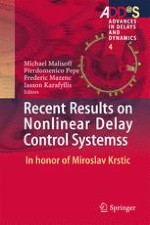2016 | Buch
Recent Results on Nonlinear Delay Control Systems
In honor of Miroslav Krstic
herausgegeben von: Iasson Karafyllis, Michael Malisoff, Frederic Mazenc, Pierdomenico Pepe
Verlag: Springer International Publishing
Buchreihe : Advances in Delays and Dynamics
